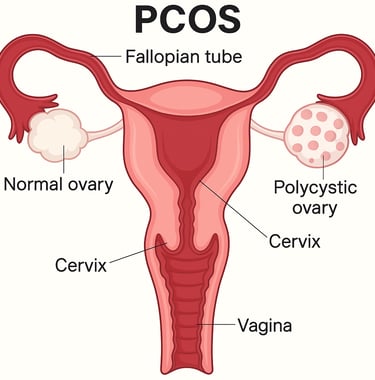PCOS and Nutrition: Discover How Diet Impacts Polycystic Ovary Syndrome
Polycystic Ovary Syndrome (PCOS) affects millions of women worldwide, influencing hormonal balance, metabolism, and overall well-being. In this post, we explore the critical role nutrition plays in managing PCOS symptoms and improving quality of life. Learn how dietary choices can help regulate insulin levels, reduce inflammation, and support hormonal health.
PCOS and Nutrition: Discover How Diet Impacts Polycystic Ovary Syndrome
Polycystic Ovary Syndrome (PCOS) is one of the most common hormonal disorders affecting women of reproductive age. Despite its complexity, understanding how nutrition influences PCOS can be a powerful tool to manage symptoms and improve overall health.
What is PCOS?
PCOS, or Polycystic Ovary Syndrome, is a condition that happens when a girl’s ovaries make too many hormones called androgens (sometimes called “male hormones,” but everyone has some). These extra hormones cause the ovaries to develop many small fluid-filled sacs called cysts — that’s why it’s called “polycystic” (poly = many, cystic = cysts). Normally, the ovaries release an egg every month during a cycle. But with PCOS, the hormone imbalance can stop the eggs from maturing properly, so they don’t get released regularly. This causes irregular periods or sometimes no periods at all.
The extra androgens can also cause other changes like more hair growth on the face or body, acne, or changes in weight. Another important thing is that PCOS often causes the body to not use insulin well — insulin is a hormone that helps control sugar in the blood. When the body resists insulin, it can lead to higher blood sugar and more hormone problems.
The Role of Nutrition in PCOS
Nutrition plays a crucial role in managing PCOS because many women with this condition experience insulin resistance — meaning their bodies have trouble using insulin effectively. Insulin resistance can worsen symptoms and increase the risk of developing type 2 diabetes and heart disease. Throughout the years, it has become clear that controlling inflammation and improving insulin sensitivity are key strategies for managing the condition and restoring hormonal balance.
This doesn’t mean you have to cut out all your favorite foods — you can still enjoy them, just aim for balance and moderation. Including occasional treats while focusing on nourishing your body with wholesome foods is both realistic and sustainable. However, by focusing on a balanced, nutrient-rich diet, women with PCOS can support better hormone regulation:
Improve insulin sensitivity: Choosing low glycemic index (GI) foods like whole grains, legumes, and vegetables helps regulate blood sugar levels.
Reduce inflammation: Incorporating anti-inflammatory foods such as fatty fish, nuts, seeds, and colorful fruits and vegetables supports hormonal balance.
Manage weight: Maintaining a healthy weight can alleviate PCOS symptoms and improve fertility outcomes.
Practical Nutrition Tips for PCOS
Prioritize whole, unprocessed foods: Minimize sugary snacks, refined carbs, and processed foods.
Include healthy fats: Avocados, olive oil, and omega-3 rich foods can help regulate hormones.
Eat regular meals: Avoid skipping meals to maintain stable blood sugar.
Stay hydrated: Drinking enough water supports metabolism and overall health.
Include exercise: Exercise helps increase insulin sensitivity because your muscles use glucose (sugar) for energy during physical activity, which lowers blood sugar levels and reduces the need for insulin
Beyond Diet: A Holistic Approach
While nutrition is key, managing PCOS effectively often requires a comprehensive lifestyle approach that includes regular physical activity, stress management, and medical guidance.


References
Teede, H. J., Misso, M. L., Costello, M. F., Dokras, A., Laven, J., Moran, L., … & Norman, R. J. (2018). Recommendations from the international evidence-based guideline for the assessment and management of polycystic ovary syndrome. Human Reproduction, 33(9), 1602-1618.
https://doi.org/10.1093/humrep/dey256Moran, L. J., Ko, H., Misso, M., Marsh, K., Noakes, M., Talbot, M., & Teede, H. J. (2019). Dietary composition in the treatment of polycystic ovary syndrome: A systematic review to inform evidence-based guidelines. Obesity Reviews, 20(7), 1142-1163.
https://doi.org/10.1111/obr.12835Hutchison, S. K., Stepto, N. K., Harrison, C. L., Strauss, B. J., & Teede, H. J. (2011). Effects of exercise on insulin resistance and body composition in overweight and obese women with polycystic ovary syndrome: a randomized controlled trial. Diabetes Care, 34(7), 1513-1519.
(Note: This one is before 2018 but is a landmark study; consider newer reviews that cite it.)Rossi, M., Chiodini, P., & Orio, F. (2020). The role of lifestyle changes in the management of polycystic ovary syndrome. Endocrine, 68(3), 485-496.
https://doi.org/10.1007/s12020-020-02436-1Patel, S. S., & Shah, P. (2021). Impact of nutrition and lifestyle modifications on polycystic ovary syndrome. Journal of Human Nutrition and Dietetics, 34(1), 26-35.
https://doi.org/10.1111/jhn.12815
